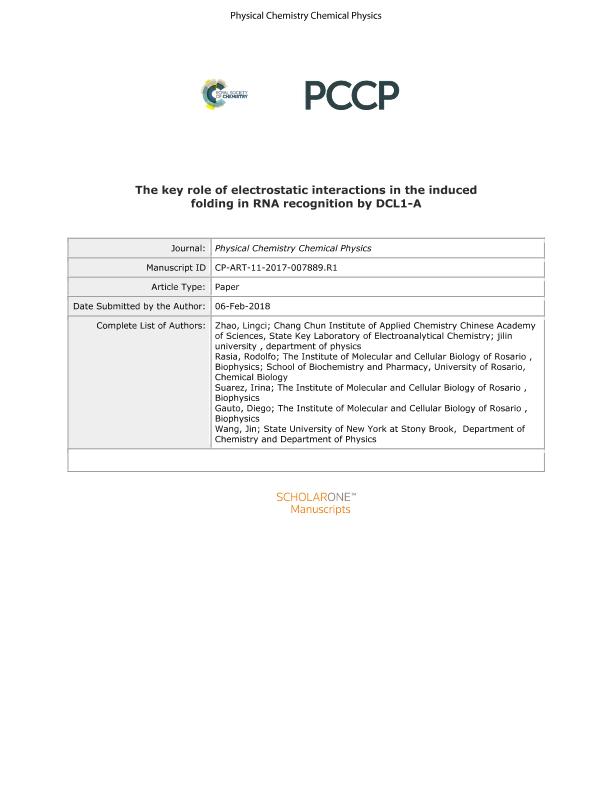Mostrar el registro sencillo del ítem
dc.contributor.author
Zhao, Lingci
dc.contributor.author
Suarez, Irina Paula

dc.contributor.author
Gauto, Diego Fernando

dc.contributor.author
Rasia, Rodolfo Maximiliano

dc.contributor.author
Wang, Jin
dc.date.available
2019-11-07T17:57:07Z
dc.date.issued
2018-03
dc.identifier.citation
Zhao, Lingci; Suarez, Irina Paula; Gauto, Diego Fernando; Rasia, Rodolfo Maximiliano; Wang, Jin; The key role of electrostatic interactions in the induced folding in RNA recognition by DCL1-A; Royal Society of Chemistry; Physical Chemistry Chemical Physics; 20; 14; 3-2018; 9376-9388
dc.identifier.issn
1463-9076
dc.identifier.uri
http://hdl.handle.net/11336/88186
dc.description.abstract
The intrinsically disordered protein domain DCL1-A is the first report of a complete double stranded RNA binding domain folding upon binding. DCL1-A recognizes the dsRNA by acquiring a well-folded structure after engagement with its interaction partner. Despite the structural characterization of the interaction complex underlying the recognition of dsRNA has been established, the dynamics of disorder-to-order transitions in the binding process remains elusive. Here we have developed a coarse-grained structure-based model with consideration of electrostatic interactions to explore the mechanism of the coupled folding and binding. Our approach led to remarkable agreements with both experimental and theoretical results. We quantified the global binding-folding landscape, which indicates a synergistic binding induced folding mechanism. We further investigated the effect of electrostatic interactions in this coupled folding and binding process. It reveals that non-native electrostatic interactions dominate the initial stage of the recognition. Our results help improve our understanding of the induced folding of the IDP DCL1-A upon binding to dsRNA. Such methods developed here can be applied for further explorations of the dynamics of coupled folding and binding systems.
dc.format
application/pdf
dc.language.iso
eng
dc.publisher
Royal Society of Chemistry

dc.rights
info:eu-repo/semantics/openAccess
dc.rights.uri
https://creativecommons.org/licenses/by-nc-sa/2.5/ar/
dc.subject
INTRINSICALLY DISORDERED PROTEINS
dc.subject
BINDING INDUCED FOLDING
dc.subject
MICRORNA
dc.subject
DCL1
dc.subject.classification
Biofísica

dc.subject.classification
Ciencias Biológicas

dc.subject.classification
CIENCIAS NATURALES Y EXACTAS

dc.title
The key role of electrostatic interactions in the induced folding in RNA recognition by DCL1-A
dc.type
info:eu-repo/semantics/article
dc.type
info:ar-repo/semantics/artículo
dc.type
info:eu-repo/semantics/publishedVersion
dc.date.updated
2019-10-21T19:58:23Z
dc.journal.volume
20
dc.journal.number
14
dc.journal.pagination
9376-9388
dc.journal.pais
Reino Unido

dc.description.fil
Fil: Zhao, Lingci. Jilin University; República de China. Chinese Academy of Sciences; República de China
dc.description.fil
Fil: Suarez, Irina Paula. Consejo Nacional de Investigaciones Científicas y Técnicas. Centro Científico Tecnológico Conicet - Rosario. Instituto de Biología Molecular y Celular de Rosario. Universidad Nacional de Rosario. Facultad de Ciencias Bioquímicas y Farmacéuticas. Instituto de Biología Molecular y Celular de Rosario; Argentina
dc.description.fil
Fil: Gauto, Diego Fernando. Consejo Nacional de Investigaciones Científicas y Técnicas. Centro Científico Tecnológico Conicet - Rosario. Instituto de Biología Molecular y Celular de Rosario. Universidad Nacional de Rosario. Facultad de Ciencias Bioquímicas y Farmacéuticas. Instituto de Biología Molecular y Celular de Rosario; Argentina
dc.description.fil
Fil: Rasia, Rodolfo Maximiliano. Consejo Nacional de Investigaciones Científicas y Técnicas. Centro Científico Tecnológico Conicet - Rosario. Instituto de Biología Molecular y Celular de Rosario. Universidad Nacional de Rosario. Facultad de Ciencias Bioquímicas y Farmacéuticas. Instituto de Biología Molecular y Celular de Rosario; Argentina
dc.description.fil
Fil: Wang, Jin. Jilin University; República de China. Chinese Academy of Sciences; República de China
dc.journal.title
Physical Chemistry Chemical Physics

dc.relation.alternativeid
info:eu-repo/semantics/altIdentifier/doi/http://dx.doi.org/10.1039/c7cp07889g
dc.relation.alternativeid
info:eu-repo/semantics/altIdentifier/url/https://pubs.rsc.org/en/content/articlelanding/2018/CP/C7CP07889G
Archivos asociados
